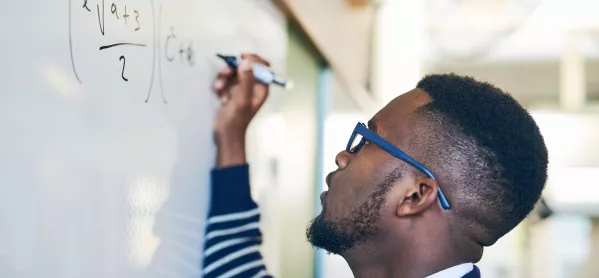- Home
- What about the risk for black and Asian teachers?
What about the risk for black and Asian teachers?

The first day of June is fast approaching and, as a black primary school teacher, I am concerned about what this wider opening of schools will mean for black and Asian educators, students and their families.
Coronavirus has shattered communities across the country and has impacted everyone across the UK.
However, we cannot ignore the frightening facts that it has hit black and Asian communities hardest.
Black people are four times more likely to die from the virus than white people. Black families are grieving in isolation and finding it difficult to come to terms with what is going on.
Coronavirus: ‘How do we ensure fair grades for BAME students?’
Exam cancellations: Equalities watchdog warns Ofqual over GCSE grading bias
Read more: Exam grading: Avoiding unconscious bias and other tips
Black British communities are experiencing first-hand how quickly this virus has taken lives.
For me, each week that has passed since early March has brought bad news, as more friends have lost family members to Covid-19.
Knowing that we are overrepresented in the number of coronavirus deaths in the UK is anxiety-inducing.
Coronavirus: Black teachers ‘are scared’
Despite this, and despite the government recognising the disproportionately higher mortality rate among black and Asian key workers, it has not acknowledged this in its plans for reopening our schools or offered any guidance on how to protect black staff and their students.
This is deeply concerning.
The composition of schools across the country varies widely. Many schools have over 90 per cent black and Asian pupils. Has the government considered the difference in risk involved?
Many are scared - understandably. A recent NEU teaching union survey showed that nearly 70 per cent (1,733) of black staff said they would feel “very unsafe” about returning to the workplace.
Yet the lack of any guidance from the Department for Education leaves black and Asian educators and their communities especially at risk.
Bias and stereotyping
By ignoring this, the government is effectively leaving the decision on how to protect us up to school leaders and individuals on a case-by-case basis. This is effectively putting the onus on to individual black educators.
For many black educators, including myself, stereotyping and unconscious bias are things we regularly face at work.
This makes it difficult to raise our concerns and bring attention to any concerns we may have regarding our safety.
Headteachers should be cognizant and inclusive when making decisions regarding our safety.
Conversations with staff are a simple but important starting point -school leaders need to be aware of how any black, Asian or other minority-ethnic staff member may be feeling.
A horrible dilemma
Of course, as a Year 6 teacher, I miss being in the classroom, the face-to-face learning I usually get to deliver and providing support and guidance for transition to secondary school.
But teaching in an inner-city London borough where a significant amount of my borough and school’s population include black and Asian children, I am more frightened of the impact that my Year 6 class being called back into schools could have.
Many of their parents will work in our frontline services or work in industries that prime minister Boris Johnson stated should return to work, leaving parents with no option but to send their children into school.
Without widespread testing and suitable personal protective equipment, and with children often asymptomatic, the risk of these children passing the virus on to their families and in turn the wider community is high.
Illnesses such as diabetes are high within the black community, with many black and Asian educators and staff living with family members in the highly vulnerable category.
Many are apprehensive about not being able to keep these at-risk family members safe.
Safety first for all
Educators are working hard to ensure that all children are still learning and feel like they are part of their school community.
The rush back to school cannot come before the safety of school staff and children.
This crisis will have already been deeply traumatic for many children, with many suffering a loss in the family.
Traumatised and bereaved children do not learn well. Staff do not teach well when deeply concerned for their own health and those around them.
To protect black and Asian pupils, the government must explicitly recognise the additional dangers that we face and implement full precautions as we look to end lockdown.
Karina Maloney is a primary teacher in south-east London
Keep reading for just £1 per month
You've reached your limit of free articles this month. Subscribe for £1 per month for three months and get:
- Unlimited access to all Tes magazine content
- Exclusive subscriber-only stories
- Award-winning email newsletters